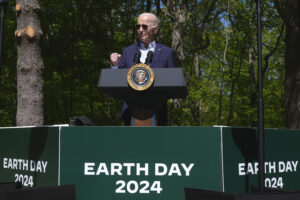Inside the Fossil Fuel Industry’s Climate-Denial Social Media Echo Chamber
Research finds signs of “coordinated climate obstruction efforts” among oil, plastics and agrichemical industries in social media messaging. (Image: Adobe)
(Image: Adobe)
From 2008 to 2023, nine of the nation’s largest oil, agrichemical and plastics trade groups and corporations posted thousands of times on the social media platform X, and their messaging on environmental issues was strikingly “obstructive” for climate policy and action, a study published in the journal PLOS Climate concludes.
The study found that all of the organizations, including the American Petroleum Institute (API) and the American Farm Bureau Federation (AFBF), were mentioned by at least four of the other groups — essentially creating an echo chamber for similar messages. The groups also frequently tagged regulators and the media in their posts, with researchers finding the Environmental Protection Agency was tagged 795 times and the Wall Street Journal, the most mentioned media organization, tagged 517 times out of more than 125,000 posts.
“Our study suggests that climate obstruction in different industries is more coordinated than is generally recognized,” said co-author Jennie Stephens, professor of Sustainability Science and Policy at Northeastern University and of Climate Justice at the National University of Ireland Maynooth.
“Combined with the high engagement of the petrochemical derivative and fuel sectors with government regulatory, policy and political entities in the energy and environmental in particular, this suggests strategic attempts to undermine and subvert climate policy through social media,” the authors wrote.
The API did not respond to requests for comment on the new research.

The AFBF said it would need more time to review the newly published study, but that AFBF has “contributed positively to developing voluntary, market-based programs that are advancing climate-smart farming and helping America reach its sustainability goals.”
The third organization, the American Chemistry Council (ACC), said it would review the study. “Chemistry plays a vital role in the creation of innovative products that make our lives and our world healthier, safer, more sustainable and more productive,” spokesperson Andrea Albersheim said in an email to DeSmog. “For example, ACC members develop and create a variety of products and technologies that help save energy and reduce greenhouse gas emissions.”
“We know that all three of these sectors [studied] are dependent on petrochemicals and we were interested to know, does that mean that they’re all communicating with each other? Does it mean they’re sharing the same communications message, in relation to how petrochemicals are managed?” lead author Alaina Kinol told DeSmog. “It seems like the answer is they are communicating with each other — because they’re all tweeting at each other.”
“They’re sharing similar messages, as well,” she added.
Outside academics reached by DeSmog said the study raises questions about whether the three industries might be deliberately coordinating their messaging.
“This paper is interesting because it shows that the fossil fuel industry, plastics industry and agricultural chemicals industry all promote forms of climate denial on social media, and their messages are largely aligned with each other,” said Ben Franta, associate professor of climate litigation at the University of Oxford. “Is that alignment intentional? Are these industries engaging in a joint enterprise to deceive consumers and the public about petrochemical products and climate change?”
“What we found is very explicitly both — both denial and delay consistently or throughout.”
“We may need legal discovery to answer those questions,” Franta, who was not involved in the new study, told DeSmog.
Columbia Law School’s climate change litigation database shows only two lawsuits involving the ACC or the AFBF. In both cases, the trade associations are the plaintiffs, not the defendants.
Oil companies, by contrast, currently face lawsuits seeking billions of dollars in climate liability damages — and those damages stand to grow as the financial costs of climate change rapidly mount. This month, the U.S. Supreme Court allowed a 2020 lawsuit filed against a handful of oil giants, including ExxonMobil, to move forward. That case involves claims from the city and county of Honolulu and its water supply board that oil companies misled consumers about the hazards posed to the climate by burning fossil fuels.
Though it builds on existing research into climate denial, the new study is the first to directly look at connections between communications from the agricultural, plastic and oil industries on environmental and climate issues, according to the authors.
With the study including 15 years of posts starting in 2008, the researchers wondered if there would be a shift away from outright climate denial and toward messages that would encourage delay, Stephens said. “But what we found is very explicitly both — both denial and delay consistently or throughout.”
And that was before the 2024 election and the return to the presidency of Donald Trump, a longtime climate denier.
“So, obviously, we know that climate denial is not over,” Stephens said. “It’s come back as a strong force.”
Your support is crucial…With an uncertain future and a new administration casting doubt on press freedoms, the danger is clear: The truth is at risk.
Now is the time to give. Your tax-deductible support allows us to dig deeper, delivering fearless investigative reporting and analysis that exposes what’s really happening — without compromise.
Stand with our courageous journalists. Donate today to protect a free press, uphold democracy and unearth untold stories.






You need to be a supporter to comment.
There are currently no responses to this article.
Be the first to respond.